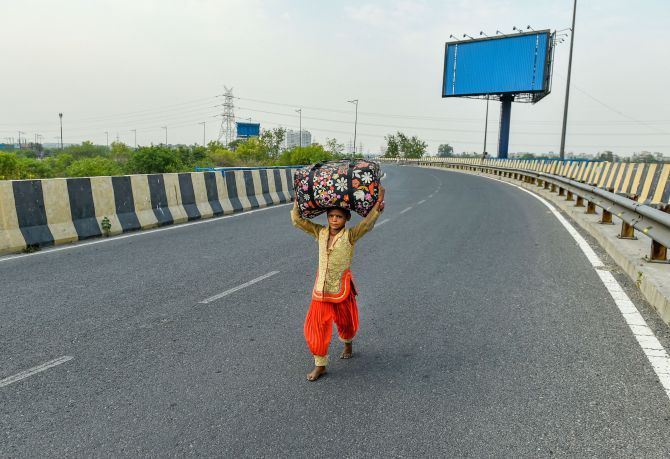The Centre on Sunday allowed inter- and intra-state movement of public vehicles with conditions and reopening of all shops except those in malls and COVID-19 containment zones as it extended the nationwide lockdown till may 31, during which flight and Metro services and all kinds of public gatherings will be barred.

Immediately after the National Disaster Management Authority, the nodal department, announced lockdown 4.0 to check the spread of the novel coronavirus, the Ministry of Home Affairs (MHA) issued fresh guidelines to allow further resumption of economic activities.
It allowed e-commerce platforms to deliver all goods, including those considered non-essential, in all areas except containment zones.
All shops, except those in containment zones and malls, will be allowed to open from Monday with staggered timings during lockdown 4.0 which includes barber shops and parlour except in containment zones.
Barber shops, salons and spas will also start functioning in non-prohibited localities while e-commerce websites will be allowed to commence the delivery of non-essential items, as per the home ministry.
Take-away and food delivery services by restaurants will also function.
However, hotels, restaurants, cinema halls, malls, swimming pools and gyms will remain shut.
Any social, political or religious functions will not be allowed to take place and places of worship will be closed till May 31, it said.
Shops providing essential commodities have been allowed to open since the beginning of the lockdown while neighbourhood shops and stand-alone shops of non-essential items were allowed to open from May 4.
Delivery of essential goods by e-commerce companies was allowed earlier too.
It allowed inter-state and intra-state movements of passenger vehicles and buses from areas other than the containment zones. However, the guidelines made it clear that bus services will be allowed with mutual consent of states and union territories involved.
All necessary standard operating procedures which includes social distancing, wearing of masks, availability of sanitiser need to be ensured.
The government also decentralised delination of Red, Green and Orange zones -- marking of areas based on COVID-19 case load -- to state and union territories but said that the same should be done after taking into consideration of parameters shared by the ministry of health and family welfare.
Night curfew shall continues to remain in place from 7 PM to 7 AM and local authorities shall ensure strict compliance with it, the order said.
The government directed persons above the age of 65 years, persons with co-mobbities, pregnant women and children below the age of 10 years to stay at home as they are more vulnerable to the deadly virus.
Domestic air travel of passengers, metro rail, schools and other educational institutions, hotels, restaurants, gyms shall remain closed and all social, political and religious gatherings will be barred.
Religious places shall be closed to public and there shall be no congregation allowed.
The Centre has, however, opened sports complexes and stadia but banned entry of spectators.
Taking a view of limited air services opened for bringing stranded Indians home and taking people through trains, the centre allowed running of canteens at bus depots, railway stations and canteens.
Issuing a nine-page guidelines, the Union home ministry listed the dos and don'ts during the lockdown 4.0 that has been clamped in the country to break the chain of coronavirus infection.
Local authorities should ensure that shops in markets, except in containment zones, open with staggered timings so as to ensure social distancing.
All shops shall have to ensure 6 feet distance (2 gaz ki doori) among customers; not allow more than 5 persons at one time.
Allowing the states and union territories to decide of coding of various zones, the home ministry said that inside the red and orange zones, containment and buffer zones will be identified by the district administration or local urban bodies.
Within the containment zones, strict perimeter control shall be maintained, and no movement of persons would be allowed, except for medical emergencies and for maintaining supply of essential goods and services.

Buffer zones are areas around each containment zone, where new cases are more likely to appear. In the buffer zones, more caution needs to be exercised.
"The Lockdown measures in place since March 25, 2020 have helped considerably in containing the spread of COVID-19. It has therefore been decided to further extend the lockdown till May 31, 2020," the home ministry said.
The death toll due to COVID-19 rose to 2,872 and the number of total positive cases climbed to 90,927 Sunday morning, according to the Union Health Ministry.
In order to facilitate the movement of persons, various modes of transport have already been opened up which includes limited train services since May 11.
Further, evacuation of foreign nationals from India, return of stranded Indian nationals from abroad, sign-on and sign-off of Indian seafarers, and intra-State and inter-State movement of stranded persons by bus and train, will continue to be allowed.
Under these guidelines, wearing of face covers is compulsory, spitting will be punishable with fine, and social distancing is to be followed by all persons in public places and in transport.
Rules barring not more than 50 persons for marriage and 20 for funeral will continue to remain in force.
The practice of work from home (WFH) should be followed to the extent possible and staggering of work hours should be adopted in respect of all offices and other establishments.
With a view to ensure safety in offices and work places, employers should ensure that Aarogya Setu app is installed by all employees having compatible mobile phones, it said.
State and UT Governments shall continue to strictly enforce the lockdown guidelines and they shall not dilute these guidelines issued under the Disaster Management Act, 2005, in any manner, the home ministry said.










